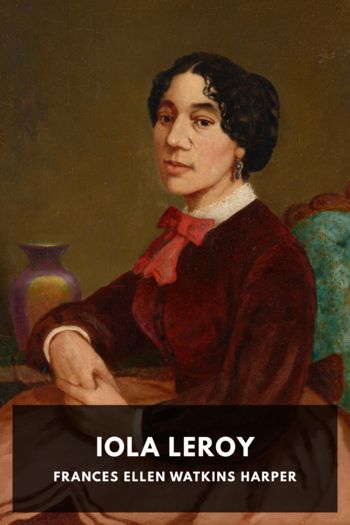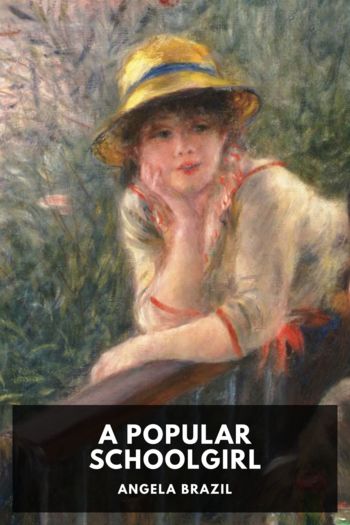Iola Leroy, Frances Ellen Watkins Harper [read aloud books .txt] 📗

- Author: Frances Ellen Watkins Harper
Book online «Iola Leroy, Frances Ellen Watkins Harper [read aloud books .txt] 📗». Author Frances Ellen Watkins Harper
Into that quiet and beautiful home three children were born, unconscious of the doom suspended over their heads.
“Oh, how glad I am,” Marie would often say, “that these children are free. I could never understand how a cultured white man could have his own children enslaved. I can understand how savages, fighting with each other, could doom their vanquished foes to slavery, but it has always been a puzzle to me how a civilized man could drag his own children, bone of his bone, flesh of his flesh, down to the position of social outcasts, abject slaves, and political pariahs.”
“But, Marie,” said Eugene, “all men do not treat their illegitimate children in the manner you describe. The last time I was in New Orleans I met Henri Augustine at the depot, with two beautiful young girls. At first I thought that they were his own children, they resembled him so closely. But afterwards I noticed that they addressed him as ‘Mister.’ Before we parted he told me that his wife had taken such a dislike to their mother that she could not bear to see them on the place. At last, weary of her dissatisfaction, he had promised to bring them to New Orleans and sell them. Instead, he was going to Ohio to give them their freedom, and make provision for their future.”
“What a wrong!” said Marie.
“Who was wronged?” said Leroy, in astonishment.
“Everyone in the whole transaction,” answered Marie. “Your friend wronged himself by sinning against his own soul. He wronged his wife by arousing her hatred and jealousy through his unfaithfulness. He wronged those children by giving them the status of slaves and outcasts. He wronged their mother by imposing upon her the burdens and cares of maternity without the rights and privileges of a wife. He made her crown of motherhood a circlet of shame. Under other circumstances she might have been an honored wife and happy mother. And I do think such men wrong their own legitimate children by transmitting to them a weakened moral fibre.”
“Oh, Marie, you have such an uncomfortable way of putting things. You make me feel that we have done those things which we ought not to have done, and have left undone those things which we ought to have done.”
“If it annoys you,” said Marie, “I will stop talking.”
“Oh, no, go on,” said Leroy, carelessly; and then he continued more thoughtfully, “I know a number of men who have sent such children North, and manumitted, educated, and left them valuable legacies. We are all liable to err, and, having done wrong, all we can do is to make reparation.”
“My dear husband, this is a wrong where reparation is impossible. Neither wealth nor education can repair the wrong of a dishonored birth. There are a number of slaves in this section who are servants to their own brothers and sisters; whose fathers have robbed them not simply of liberty but of the right of being well born. Do you think these things will last forever?”
“I suppose not. There are some prophets of evil who tell us that the Union is going to dissolve. But I know it would puzzle their brains to tell where the crack will begin. I reckon we’ll continue to jog along as usual. ‘Cotton fights, and cotton conquers for American slavery.’ ”
Even while Leroy dreamed of safety the earthquake was cradling its fire; the ground was growing hollow beneath his tread; but his ear was too dull to catch the sound; his vision too blurred to read the signs of the times.
“Marie,” said Leroy, taking up the thread of the discourse, “slavery is a sword that cuts both ways. If it wrongs the negro, it also curses the white man. But we are in it, and what can we do?”
“Get out of it as quickly as possible.”
“That is easier said than done. I would willingly free every slave on my plantation if I could do so without expatriating them. Some of them have wives and children on other plantations, and to free them is to separate them from their kith and kin. To let them remain here as a free people is out of the question. My hands are tied by law and custom.”
“Who tied them?” asked Marie.
“A public opinion, whose meshes I cannot break. If the negro is the thrall of his master, we are just as much the thralls of public opinion.”
“Why do you not battle against public opinion, if you think it is wrong?”
“Because I have neither the courage of a martyr, nor the faith of a saint; and so I drift along, trying to make the condition of our slaves as comfortable as I possibly can. I believe there are slaves on this plantation whom the most flattering offers of freedom would not entice away.”
“I do not think,” said Marie, “that some of you planters understand your own slaves. Lying is said to be the vice of slaves. The more intelligent of them have so learned to veil their feelings that you do not see the undercurrent of discontent beneath their apparent good humor and jollity. The more discontented they are, the more I respect them. To me a contented slave is an abject creature. I hope that I shall see the day when there will not be a slave in the land. I hate the whole thing from the bottom of





Comments (0)